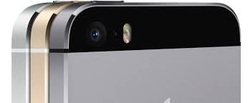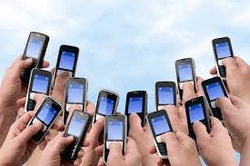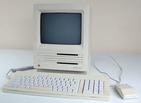And invariably, as I’m helping get the right software in place to launch the new mobile strategy, (the same strategy that wasn’t on the radar six months ago and now can’t wait til next week) I find out the hardware is going to be a PanaToshibAcerSurface 7.165. I just casually ask, did you look at the iPad? And the answer is always, “We compared the SPECS and you can’t hold a candle to the DellIBMicrosoft 2612.”
Now, as someone who always asks “why”, I have to ask myself “why” – “Why do people always come back with ‘specs’? I have a theory that it has a lot to do with the Tech Press, and a story template that’s run for 20+ years – and a template that intelligent managers need to understand if they’re going to make the best choices going forward.
Just a touch of background. My first degree is journalism, so I’m a lifelong student of both the stories and the process. I also worked in advertising with an agency that helped with the launch of the 1st Apple Macintosh 512k. From having to battle those early Tech Press stories about how ridiculous it was to have a ‘so-called mouse’ attached to a computer, how the Tech Press handles Apple has been a subject of interest. And my career included stops at ASU and University of Phoenix, teaching scintillating classes such as “Information Technology 315, Decisionmaking for Managers” basically a managerial economics class on creating value by selecting the right software solutions for businesses.
That’s why I find this week so interesting.
Leading up to the September 19th launch of the latest iPhones, the Tech Press was full of dire news regarding the end of Apple
- Yahoo reports ‘the era of the smartphone is over’ in a July article
- Business Insider laments Apple’s bad news as Android tables outship iPad
- eWeek saw Apple’s downfall as early as January
- Fudzilla reported ‘the smart money is on Android and Tesla’
- ZD News found 5 things you get on an Android that iPhone is missing
In all, Google pulls up 25 pages (until I quit counting) of negative news stories printed regarding Apple prior to last week’s launch. And while most of the Apple doom-mongers have quieted down after 9.1 million iPhones sold, you can still find a few who could spin the most successful phone launch in recorded history as bad news.
The point is not, how much and how many negative stories Apple is able to generate, but pulling back the covers to examine the process – and how this can affect managerial decsion making going forward. I’m not saying every decision should select Apple, just that your decision process shouldn’t include “Well, I have been hearing stories that Apple’s hit a rough patch” – because that’s just background noise that’s always been there and will always be there.
Why? You ask? As a guy who’s been asking why for a while, here’s a couple of thoughts to ponder – I’m not saying they’re 100% truth, but it does seem to explain the narrative. Three things to be exact.
1) Specs – Apple is constantly pilloried because when you can’t match the ease and user experience of Apple, pretty much all you’re left with is the ability to find a chip with a bit more speed or a drive with a touch more capacity, so even if it doesn’t work as well, you can claim ‘better specs’. Don’t forget “you can do more” with Windows/Android systems. This is basically a gearhead argument revised for the geek community. If you were to ask a mechanically inclined individual (gearhead) about specs, he’d tell you the ’69 Plymouth Roadrunner has more horsepower than your new Lexis (better specs). And with all the aftermarket parts that were available to modify muscle cars in ’69, the gearhead ‘can do more’ with a Roadrunner than your Lexis. However, we don’t see the ’69 Roadrunner outselling Lexis, because to the non-gearhead – they don’t care about the specs – they just like the way the Lexis drives. It gets them there. They don’t have to top off the oil every third fillup and get a tune up and new plugs every 20,000 miles (of course the gearhead can do his own tuneups and likes changing the plugs himself). Today’s techies can also ‘do more’ on non-Apple technology but for the average user, those features are simply confusing distractions as they’re just trying to do basic functions.
2) Smartest Guy in the Room – everyone likes to be the smart guy, the guy that sees what no one else sees. I think this plays well in the Tech Press – Apple makes great products, everyone loves them, Apple generally reworks whatever category they’re involved in. It makes a great headline to point out “Hey, this category killer product everyone else likes, I’m so smart I’ve found a flaw, and I’m even so much smarter I’d never use that…” It was easy to write off Apple customers as cult-like fanboys until they became the world’s most valuable corporation, and when someone’s #1, there is no where to go but down – so here’s another story angle about Apple’s demise from #1 all the way to….#2. And when Apple was in it’s lean years, the storyline was “they can’t possibly survive because they don’t have enough marketshare.” There’s no way to win against the smartest guy in the room – which if he’s so smart, why isn’t he running the world’s leading technology company instead of writing for a dwindling readership computer magazine?
3) None of this matters. It’s all about mobile – using mobile devices to access data and transactions. If you’re caught up in the hardware distinction, you’re missing the point. Most customers will likely be accessing your mobile technology with Playstation 6 controllers in a year anyway – or whatever else is coming down the pike. Stay focused on any device, anywhere – and you avoid this argument in the first place.
In closing, I mentioned my early experience battling Tech Press articles ridiculing Apple when they introduced the mouse. A few years later there was also great hilarity when the MacBook Pro came out AND APPLE FORGOT TO INCLUDE A FLOPPY DISC DRIVE! That was surely the ‘end of Apple,’ they’re doomed without floppy discs because everyone uses floppy discs…until they didn’t. Just this week we see the Microsoft Surface tablet TV Spots making fun of the iPad because it has “no USB port.” Egads. Gadzooks. How will the free world survive without USB ports?
I used to talk to my wife nightly, that was before she got an iPad mini. Now the best I can do is sit next to her in the evenings as she’s tightly focused on that little screen. I did interrupt her the other night to ask her how she could spend so much time on a device without a USB port. She didn’t actually answer, but took the time to shoot me a dirty look for asking such a silly question before she returned her full attention to whatever she was Facebooking about at the time. I think she’ll do OK without a USB port.
(Come to think about it, since Dropbox came about, one of the tasks on my to-do list is to clean out the drawer where I keep all my unused USB drives.)
This is getting too easy. It’s too predictable. Everything repeats itself if you wait long enough. Including a Tech Press that’s so focused on the here-and-now that you need a bit more perspective if you’re going to really understand the trends affecting today’s business applications.
You can contact Gene Hammons via Info@ProfitFromERP.com



